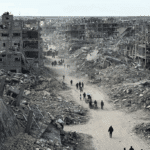Over the summer, as part of the Crossroads project, ASF is bringing you the latest news about international justice. Our teams on the ground give you the lowdown. This week, Jane Anywar Adong, Project Officer in Uganda, tells us about some recent breakthroughs in the field of international justice. The Ugandan Supreme Court’s refusal to grant amnesty to Thomas Kowoyelo, Dominic Ongwen’s transfer to the ICC…discover how these events were experienced by victims and the communities affected.
Q: Over the last six months, has any major progress been made in the field of international justice in Uganda?
A: Yes, the international justice atmosphere in Uganda has had recent major breakthroughs. Dominic Ongwen, the alleged commander of the Sinia Brigade of the Lord’s Resistance Army (LRA) rebel group in Northern Uganda, surrendered and was transferred to the International Criminal Court (ICC) in early 2015. In 2005, the ICC issued an arrest warrant against him and five other LRA commanders. He is facing charges of war crimes and crimes against humanity.
Q: If Ongwen is found guilty of international crimes and sentenced, what will this mean for the victims?
A: It has been a long wait for the victims who suffered and witnessed the crimes of Dominic Ongwen first-hand. In addition to the anticipation of his capture and surrender, they have been agitated by certain groups claiming to speak on their behalf, saying that Dominic Ongwen should be forgiven and granted amnesty. According to our experience, this is not true. Most victims we have met wanted Ongwen to be brought to trial for the crimes he committed. They want answers; they want justice. There is a glimpse of hope for victims now that Ongwen has been brought before the ICC. They are, however, sceptical about how long the trial process will take.
Q: Another breakthrough is the Supreme Court decision that overturned the grant of amnesty to another former LRA combatant, Thomas Kwoyelo.
A: Thomas Kwoyelo was captured by the Ugandan army in 2009. While in detention, Kwoyelo had applied for amnesty under the Amnesty Act, which covers crimes committed in furtherance of war or armed rebellion. In August 2010, he was charged with 12 counts of violating Uganda’s Geneva Conventions Act, including wilful killing, taking hostages and extensive destruction of property in the Amuru and Gulu districts of Northern Uganda. In 2011, however, the Constitutional Court held that Kwoyelo had acquired the legal right to amnesty under the Amnesty Act. The Attorney General filed an appeal before the Supreme Court of Uganda seeking to overturn the Constitutional Court’s decision and resume Kwoyelo’s trial. In April 2015, the Supreme Court ruled that the Amnesty Act does not grant blanket amnesty for all crimes. Crimes committed wilfully against individual civilians or communities would not ordinarily be covered by amnesty. By denying amnesty to Kwoyelo, the Ugandan courts have demonstrated their willingness to pursue justice for victims.
Q: What about the LRA Leader, Joseph Kony?
A: According to the media, several combatants have defected from the LRA and returned to Uganda. They report that Joseph Kony is suffering from arthritis and diabetes. Reports also reveal that Kony has surrendered leadership to his two sons Salim and Ali and that the two are recognised as top leaders in the LRA.
Q: What major initiatives launched by ASF in Uganda would you like to highlight?
A: ASF has taken great strides in creating awareness and marketing the ICD and the ICC. In April 2015, the Programme team conducted outreach to Universities countrywide, attracting over 700 students from the Law and other faculties. We are currently in the process of carrying out a needs assessment for legal actors to gauge their knowledge, attitudes and perceptions on international justice. The information collected will be used to develop a comparative analysis framework on international justice for training Ugandan advocates and judicial officers.
In May, the Programme team, together with judges from the ICD, prosecutors, defence lawyers, investigators and the Outreach office of the ICC conducted a community outreach to Northern Uganda. During the outreach, the ICD judges interacted with the victim communities, reassuring them of their ability to deliver justice for the crimes they suffered. Information on the ongoing Kwoyelo and Ongwen cases were discussed and the victims’ voices were heard. All stakeholders, including victims, welcomed the visit and the exchanges. In Lukodi and Pa Gak the victims expressed gratitude to the judges and encouraged them in their work. Victims and the community called for justice.
Stella was abducted when she was ten years old: ‘I should be the one granting government amnesty for failing to protect me‘. See the whole story on treating international crimes of the past in ‘Uganda : Seeking justice’ (English version only)
Cover picture: Uganda © 2014 Alexis Bouvy / Local Voices



